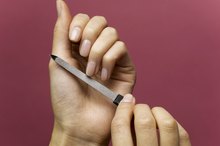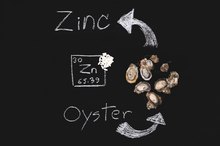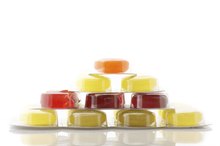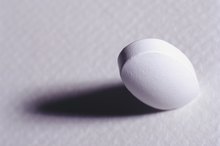Side Effects of Too Much or Not Enough Zinc
Zinc is an essential trace mineral that you must obtain from food to meet your needs. Adequate intakes of zinc support your immune system, help in wound healing and are required for protein synthesis. Healthy adult men need 11 milligrams of zinc a day, and healthy adult women need 8 milligrams. Not getting enough or getting too much zinc can have lead to serious side effects.
Hypogonadism
Inadequate intakes of zinc in men can lead to hypogonadism, a condition in which men do not produce enough testosterone, according to a review in the 2009 issue of the "Journal of the American College of Nutrition." Hypogonadism in young men can delay the onset of puberty and affect normal growth and development. In older men, it can lead to erectile dysfunction, infertility, a decrease in muscle mass, a decrease in bone mass and the development of breast tissue. It can also lead to fatigue, affect your concentration and cause hot flashes.
- Inadequate intakes of zinc in men can lead to hypogonadism, a condition in which men do not produce enough testosterone, according to a review in the 2009 issue of the "Journal of the American College of Nutrition."
- Hypogonadism in young men can delay the onset of puberty and affect normal growth and development.
Delay Growth and Development
Zinc for Nail Growth
Learn More
Inadequate intakes of zinc can also affect normal growth and development. Older infants, between the ages of 7 to 12 months, who rely solely on breast milk as their primary source of nutrition are at risk of not getting enough zinc in their diets. Zinc-deficient infants with mild to moderate growth failure can improve growth with supplementation, according to the Office of Dietary Supplements. If you breast-feed, be sure you get adequate zinc intake, without going over your recommended limit of 12 milligrams per day, as stated by the ODS.
- Inadequate intakes of zinc can also affect normal growth and development.
- Zinc-deficient infants with mild to moderate growth failure can improve growth with supplementation, according to the Office of Dietary Supplements.
Lead to Copper Deficiency
Too much zinc in your diet can lead to a copper deficiency. Daily intakes of 60 milligrams of zinc can lead to a deficiency in your copper levels. Low copper levels can lead to anemia, a decrease in your body temperature, osteoporosis, low white blood cell count, irregular heartbeat and thyroid disorders. When supplementing with zinc, doctors recommend adding a copper supplement to prevent deficiencies, according to the University of Maryland Medical Center.
- Too much zinc in your diet can lead to a copper deficiency.
- Daily intakes of 60 milligrams of zinc can lead to a deficiency in your copper levels.
Acute Intoxication
Can You Get Dizzy After Taking Zinc?
Learn More
High intakes of zinc can cause symptoms immediately. One case report noted a severe vomiting and diarrhea within 30 minutes after taking 4 grams of zinc gluconate, which is 570 milligrams of elemental zinc, according to the Office of Dietary Supplements. Other acute symptoms of zinc intoxication include headaches, nausea, vomiting, diarrhea, loss of appetite and abdominal cramps. The maximum upper limit of zinc intake for adults, listed by the ODS is 40 milligrams.
- High intakes of zinc can cause symptoms immediately.
- One case report noted a severe vomiting and diarrhea within 30 minutes after taking 4 grams of zinc gluconate, which is 570 milligrams of elemental zinc, according to the Office of Dietary Supplements.
Zinc in Food
Eating a balanced diet that includes a variety of foods will help ensure you get enough zinc in your diet, but not too much. Good food sources of zinc include oysters, beef shanks, crab legs, fortified breakfast cereals, cashews and baked beans, according to the Office of Dietary Supplements.
Related Articles
References
- Office of Dietary Supplements: Zinc
- Journal of the American College of Nutrition: Impact of the Discovery of Human Zinc Deficiency on Health
- Kara, E., Gunay, M., Cicioglu, I., Ozal, M., Kilic, M., Mogulkoc, R., & Baltaci, A. K. (2010). Effect of zinc supplementation on antioxidant activity in young wrestlers. Biological Trace Element Research, 134(1), 55-63. Â
- Prasad, A. S., Mantzoros, C. S., Beck, F. W., Hess, J. W., & Brewer, G. J. (1996). Zinc status and serum testosterone levels of healthy adults. Nutrition, 12(5), 344-348.
- Yang, Y., Jing, X. P., Zhang, S. P., Gu, R. X., Tang, F. X., Wang, X. L., ... & Wang, J. Z. (2013). High dose zinc supplementation induces hippocampal zinc deficiency and memory impairment with inhibition of BDNF signaling. PLoS One, 8(1), e55384.
- Amani, R., Saeidi, S., Nazari, Z., & Nematpour, S. (2010). Correlation between dietary zinc intakes and its serum levels with depression scales in young female students. Biological Trace Element Research, 137(2), 150-158.
- Table, E., & Table, V. (2001). Dietary reference intakes for vitamin A, vitamin K, arsenic, boron, chromium, copper, iodine, iron, manganese, molybdenum, nickel, silicon, vanadium, and zinc.
- Wilborn, C. D., Kerksick, C. M., Campbell, B. I., Taylor, L. W., Marcello, B. M., Rasmussen, C. J., ... & Kreider, R. B. (2004). Effects of zinc magnesium aspartate (ZMA) supplementation on training adaptations and markers of anabolism and catabolism. Journal of the International Society of Sports Nutrition, 1(2), 12.
- Brilla, L. R., & Conte, V. (2000). Effects of a novel zinc-magnesium formulation on hormones and strength. Journal of Exercise Physiology Online, 3(4), 26-36.
- Kara, E., Gunay, M., Cicioglu, I., Ozal, M., Kilic, M., Mogulkoc, R., & Baltaci, A. K. (2010). Effect of zinc supplementation on antioxidant activity in young wrestlers. Biological Trace Element Research, 134(1), 55-63. Â
- Bao, B., Prasad, A. S., Beck, F. W., Fitzgerald, J. T., Snell, D., Bao, G. W., ... & Cardozo, L. J. (2010). Zinc decreases C-reactive protein, lipid peroxidation, and inflammatory cytokines in elderly subjects: a potential implication of zinc as an atheroprotective agent. The American Journal of Clinical Nutrition, 91(6), 1634-1641.
- Espinoza, A., Le Blanc, S., Olivares, M., Pizarro, F., Ruz, M., & Arredondo, M. (2012). Iron, copper, and zinc transport: inhibition of divalent metal transporter 1 (DMT1) and human copper transporter 1 (hCTR1) by shRNA. Biological Trace Element Research, 146(2), 281-286.
- Tandy, S., Williams, M., Leggett, A., Lopez-Jimenez, M., Dedes, M., Ramesh, B., ... & Sharp, P. (2000). Nramp2 expression is associated with pH-dependent iron uptake across the apical membrane of human intestinal Caco-2 cells. Journal of Biological Chemistry, 275(2), 1023-1029.
- Festa, M. D., Anderson, H. L., Dowdy, R. P., & Ellersieck, M. R. (1985). Effect of zinc intake on copper excretion and retention in men. The American Journal of Clinical Nutrition, 41(2), 285-292
Writer Bio
Jill Corleone is a registered dietitian and health coach who has been writing and lecturing on diet and health for more than 15 years. Her work has been featured on the Huffington Post, Diabetes Self-Management and in the book "Noninvasive Mechanical Ventilation," edited by John R. Bach, M.D. Corleone holds a Bachelor of Science in nutrition.









